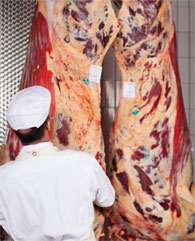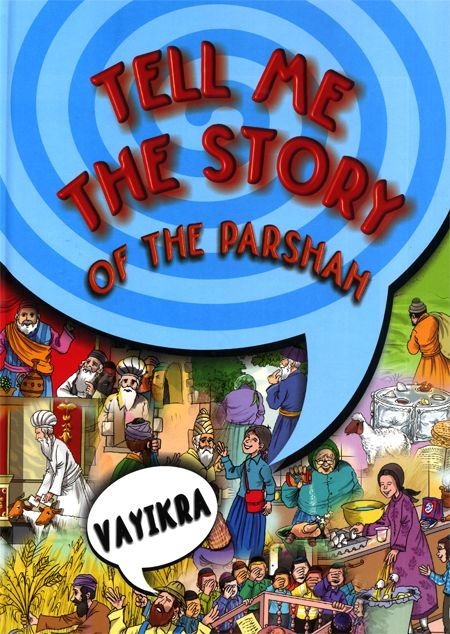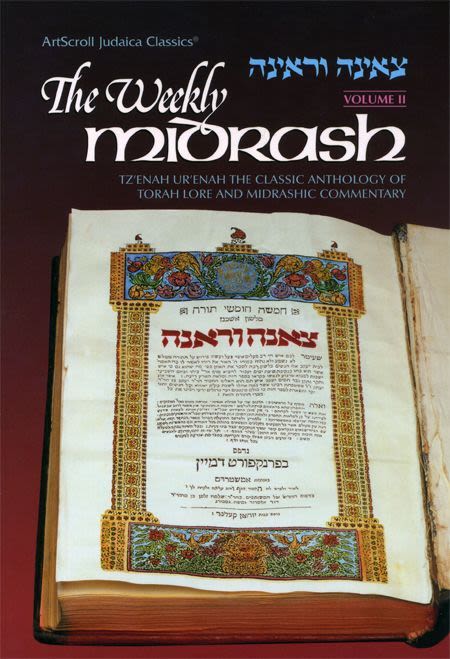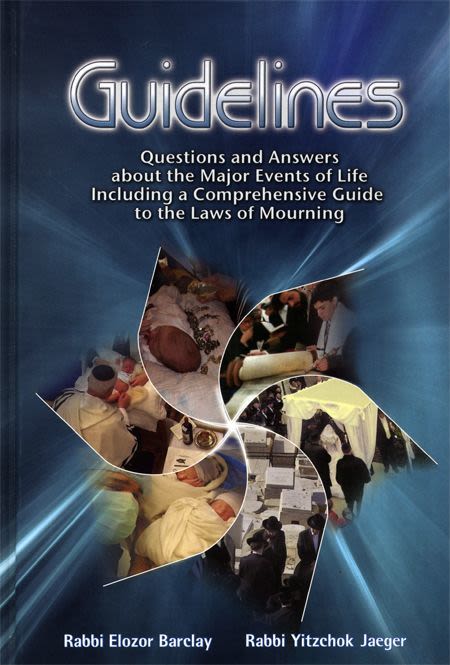
Haazinu: The Simple Butcher
Hashem's justice is the epitome of truth and fairness; the things we do for or against other people create spiritual forces that come right back at us...

“…He is the G-d of faithfulness with no injustice, righteous and truthful.” (Deuteronomy 32:4)
Rashi tells us that even though transgressors anger Hashem, He doesn't react out of wrath and vengeance, and gives everyone a fair trial, to the extent where ultimately, everyone agrees to His verdicts. The Zohar adds that when people reach the world to come, they see how they signed their own verdicts.
Sceptics, those who complain about their particular tribulations say, "No way! I never agreed to such a verdict!" True, he never agreed that such a thing should happen to him, but he ended reaping the sour grapes he gave to others.
Hashem is so faithful, righteous and truthful that He lets a person dictate his or her own set of laws. The way they give themselves license to act toward others is the way others end up acting toward them. Afterwards, they should direct all complaints to the nearest mirror.
Here is a true story (names changed for obvious reasons) that demonstrates how this works:
Jacob, a G-d fearing kosher butcher, did back-breaking work lifting and cutting up heavy sides of beef, making a modest salary despite the long daily hours he put in. When his son and two daughters were 12,  10 and 7, his wife died of a terminal disease and Jacob was left alone to raise his children. His already difficult life became a formidable daily challenge that only a man of faith and iron will could withstand. After eleven hours on his feet cutting meat and schlepping carcasses, he'd grab a quick minyan then run home to cook, clean and launder.
10 and 7, his wife died of a terminal disease and Jacob was left alone to raise his children. His already difficult life became a formidable daily challenge that only a man of faith and iron will could withstand. After eleven hours on his feet cutting meat and schlepping carcasses, he'd grab a quick minyan then run home to cook, clean and launder.
Hashem had compassion on the upright and hardworking butcher, and less than a year after his wife died, a family from the neighborhood suggested that he meet their cousin, a woman in her mid-thirties who was visiting Far Rockaway from Israel. Jacob, an Ashkenazi Jew who had come to America from Russia with his parents when he was twelve, never had contact with Sephardi Jews, much less those from Israel. Yet, he immediately was enamored with Ora's good heart, Moroccan-Jewish candor and sweet smile. They went out for two weeks and got engaged.
Ora had never been married. After their seven day sheva-brachot honeymoon week, she willfully assumed the responsibilities of surrogate mother, treating Jacob's three children as if they were hers from the womb. The son, now after his Bar Mitzva, resented his father's new wife but the two daughters loved her dearly. By virtue of Ora's selfless sacrifice to the children, she and Jacob were soon blessed with a child of their own, a lovely baby daughter with her mother's almond-in-chocolate eyes and silky black hair.
Four years passed and Yonatan, Jacob's son, was accepted into one of New York's most prestigious yeshivas. He earned a reputation of academic excellence and perseverance; not that he was learning so much for Hashem's sake, for he vowed to distance himself as far as he could from his "plebian" father, a simple butcher whom he was ashamed off. Now, as a Torah scholar in one of the finest yeshivas, he looked down on his father, the simple butcher. Little did he feel his father's dedication in toiling triply hard to pay for his son's tuition and to try and save as much money as he could to marry him off, which wasn't that far in the future. Yet, Jacob wasn't getting any younger. His hands and arms were torn with knife scars. His back wasn't what it used to be ten years ago. His doctor warned him to be careful, for he was a prime candidate for a hernia from all the heavy lifting.
Ora did everything in her power to lighten Jacob's load, emotionally and financially. Silently, she suffered the condescending cold shoulder that the young "Torah scholar" would give her on the monthly weekend when he came home. Instead of resenting the lad, Ora did everything to save every dollar for his wedding and future. She returned his animosity with kindness. She denied herself new things and sewed all the girls' clothes. She cooked and baked everything from scratch. She'd go across town to save a few dollars on groceries. All the thanks she received from Yonatan was a monthly pile of dirty laundry.
Yonatan's Rosh Yeshiva had a daughter with a terrible disposition and a bloated sense of entitlement. Her father knew that any family that was looking for a righteous young lady would not take this young lady for their son. Nevertheless, the Rosh Yeshiva knew how to pawn her off: the butcher's son would be happy to have her simply to gain the status as the Rosh Yeshiva's son-in-law. Jacob and Ora had nothing to say in the matter. Yonatan bluntly informed them that now that he had turned 22, he'd be marrying the Rosh Yeshiva's daughter. Jacob, like a calf led to slaughter, had nothing to say in the matter. Indeed, he was expected to come up with $40,000 cash, as his share of the wedding expenses. "I'm doing you a favor," said the smooth talking Rosh Yeshiva, bloated with arrogance. "I'm paying for two-thirds of the expenses and I'm letting your son have my daughter."
The young bride and groom did everything to make Ora's life miserable. They chided her, insulted her and did everything to humiliate the "lowly butcher's wife" who spoke pigeon English. Ora nearly had a nervous breakdown. Jacob finally put his foot down. "If you both cannot properly respect my wife, you are no longer welcome in my home!" He severed relations with his own son and daughter-in-law…
Years passed. Jacob's son became a Rosh Yeshiva with prestige and a good salary. He and his wife had six children. They lived a life of "frum veneer", Torah excellence without emuna and good character. Their children were not allowed to visit their "butcher grandfather" and his "coarse wife". Yonatan's ingratitude to his step-mother was surpassed only by his wife's insufferable snobby attitude.
Fortunes turn around. Our sages tell us that he who learns Torah in poverty ends up learning in riches. Jacob inherited a huge sum of money from an uncle in Kiev who was childless. With the encouragement of his dedicated wife who wanted nothing more than to see her husband immersed in Torah, he was now sitting and learning all day long in a Chassidic kollel, no longer breaking his back and breaking down beef. His three daughters married wonderful boys from upright families. After years of struggling, Ora and he were reaping fruits of unimaginable joy.
Meanwhile, Yonatan lost his job as Rosh Yeshiva. When his father-in-law died, he inherited nothing but debts. His oldest son, now 21, came home and informed his father that he too was marrying the daughter of his Rosh Yeshiva, just like daddy. This young lady had chutzpa that made Yonatan's wife look like Alice in Wonderland. They suffered untold anguish from her. Yet, never once did it occur to Yonatan and his wife to ask for Ora's forgiveness…
Hashem knows how to educate. There's much more to the above story, but it's superfluous at this point. Hashem isn't vindictive – He's the epitome of absolute justice. We all get what we give. So, if we expect kindness and compassion from Above, we should spread kindness and compassion below. Gmar Chatima Tova!










10/15/2016
Only Hashem has the missing link
In Hashem's Divine plan, Jacob was destined to be a Torah scholar and not a butcher; his second wife, Ora, with her wonderful middot, uplifted him to that level. This we can see. Jacob also made a painful but correct choice in backing up his wife when his son and daughter in-law didn't properly respect her. He didn't lose his son – his son chose to be ungrateful and inasmuch forfeited his father and step-mother.
10/15/2016
In Hashem's Divine plan, Jacob was destined to be a Torah scholar and not a butcher; his second wife, Ora, with her wonderful middot, uplifted him to that level. This we can see. Jacob also made a painful but correct choice in backing up his wife when his son and daughter in-law didn't properly respect her. He didn't lose his son – his son chose to be ungrateful and inasmuch forfeited his father and step-mother.
10/13/2016
Missing Link
I know the answer will be "Hashem calculates everything, etc". My question is why did Jacob 'suffer' with losing his wife and then his son (and grandchildren).